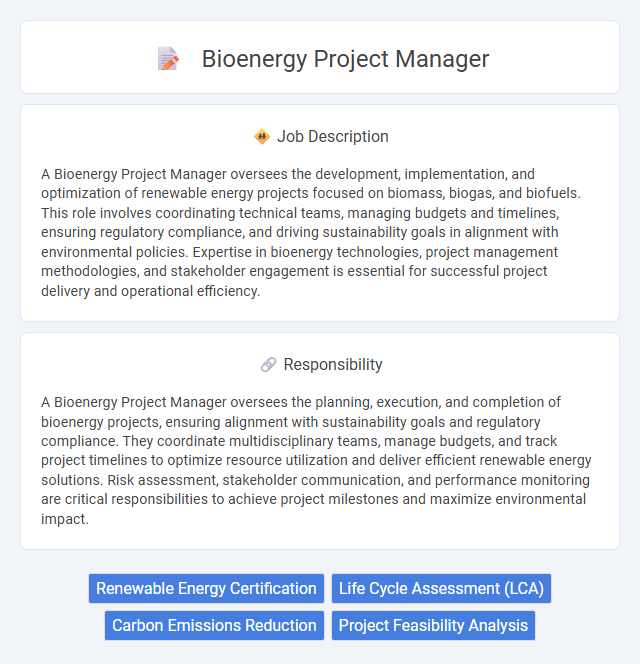
A Bioenergy Project Manager oversees the development, implementation, and optimization of renewable energy projects focused on biomass, biogas, and biofuels. This role involves coordinating technical teams, managing budgets and timelines, ensuring regulatory compliance, and driving sustainability goals in alignment with environmental policies. Expertise in bioenergy technologies, project management methodologies, and stakeholder engagement is essential for successful project delivery and operational efficiency.
Individuals with strong organizational skills and a background in environmental science or engineering will likely find the role of a bioenergy project manager suitable. Those comfortable with coordinating multidisciplinary teams and managing budgets under tight deadlines may thrive in this dynamic environment. People who prefer structured tasks with less variability in daily activities might not find this position ideal.
Qualification
A Bioenergy Project Manager typically holds a bachelor's degree in environmental science, renewable energy, engineering, or a related field, with a preference for candidates possessing advanced degrees or certifications in bioenergy or project management. Proven experience in managing renewable energy projects, particularly in biomass, biogas, or biofuel sectors, is essential for effective leadership and technical oversight. Strong skills in budget management, regulatory compliance, and cross-disciplinary team coordination enhance the project manager's ability to deliver successful bioenergy solutions.
Responsibility
A Bioenergy Project Manager oversees the planning, execution, and completion of bioenergy projects, ensuring alignment with sustainability goals and regulatory compliance. They coordinate multidisciplinary teams, manage budgets, and track project timelines to optimize resource utilization and deliver efficient renewable energy solutions. Risk assessment, stakeholder communication, and performance monitoring are critical responsibilities to achieve project milestones and maximize environmental impact.
Benefit
A Bioenergy Project Manager likely enhances renewable energy initiatives by overseeing efficient project execution and resource allocation, which may result in reduced carbon emissions and long-term cost savings. Their leadership could drive innovation and sustainability practices, potentially boosting company reputation and market competitiveness. Career growth prospects in this role might include expanding expertise in green technologies and contributing significantly to environmental impact goals.
Challenge
Managing a bioenergy project likely involves navigating complex regulatory environments and adapting to evolving renewable energy policies. The challenge may also stem from coordinating multidisciplinary teams while ensuring the project meets sustainability and efficiency targets. Risk assessment and mitigation related to technological innovation and market fluctuations are probable ongoing concerns.
Career Advancement
A Bioenergy Project Manager oversees the planning, execution, and completion of renewable energy projects, specializing in biomass and organic waste-to-energy technologies. Mastery of project management methodologies and expertise in sustainable energy systems pave the way for advancement into senior leadership roles such as Director of Renewable Energy or Chief Sustainability Officer. Continuous professional development and certifications in renewable energy and environmental management significantly enhance career growth opportunities in this evolving sector.
Key Terms
Renewable Energy Certification
A Bioenergy Project Manager specializing in Renewable Energy Certification oversees the development and execution of bioenergy projects to ensure compliance with regulatory standards and certification protocols such as the Renewable Energy Certificate (REC) programs. They coordinate with stakeholders to monitor project performance, verify renewable fuel sources, and facilitate documentation required for carbon offset credits and sustainability reporting. Expertise in lifecycle assessment and knowledge of regional energy markets are essential for optimizing project eligibility and maximizing financial incentives linked to certified renewable energy generation.
Life Cycle Assessment (LCA)
A Bioenergy Project Manager specializing in Life Cycle Assessment (LCA) evaluates the environmental impacts of bioenergy production from feedstock cultivation to end-use. They analyze greenhouse gas emissions, energy balance, and resource efficiency to optimize sustainability across the entire bioenergy value chain. Expertise in LCA software like SimaPro or GaBi is essential for accurate modeling and reporting in regulatory and certification processes.
Carbon Emissions Reduction
Bioenergy project managers oversee the development and implementation of renewable energy initiatives that convert biomass into sustainable fuels, significantly contributing to carbon emissions reduction. Their role involves optimizing supply chains, managing project timelines, and ensuring compliance with environmental regulations to maximize greenhouse gas mitigation. Expertise in lifecycle carbon analysis and renewable energy technologies is essential to drive innovative solutions for lowering carbon footprints.
Project Feasibility Analysis
Bioenergy project managers conduct comprehensive project feasibility analysis to evaluate the technical, economic, and environmental viability of renewable energy initiatives utilizing biomass resources. This process includes assessing feedstock availability, energy conversion technologies, regulatory compliance, and financial projections to ensure sustainable and profitable project outcomes. Expertise in lifecycle cost assessment and risk management is essential to optimize resource allocation and drive successful bioenergy project development.
 kuljobs.com
kuljobs.com